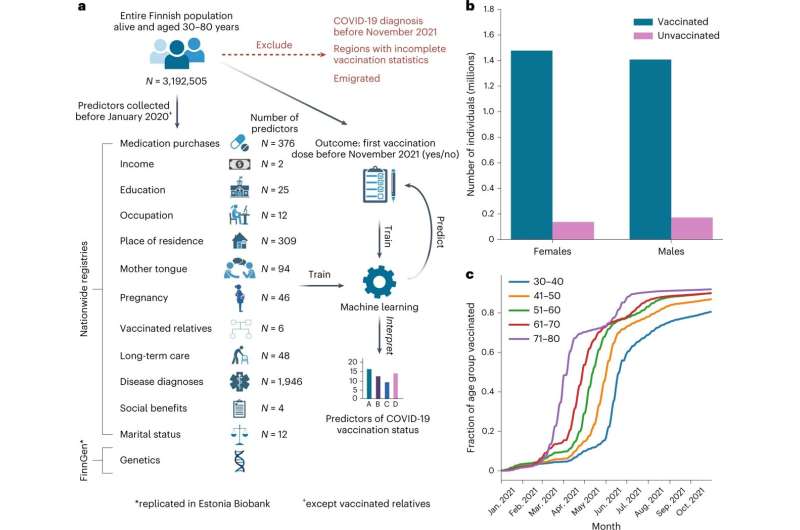This article has been reviewed according to Science X's editorial process and policies. Editors have highlighted the following attributes while ensuring the content's credibility:
fact-checked
peer-reviewed publication
trusted source
proofread
Finnish population-based study: Vulnerable groups were the least likely to uptake COVID-19 vaccination

A large-scale registry study in Finland has identified several factors associated with uptake of the first dose of COVID-19 vaccination. In particular, persons with low or no labor income and persons with mental health or substance abuse issues were less likely to vaccinate.
The study, carried out in collaboration between the University of Helsinki and the Finnish Institute of Health and Welfare, tested the association of nearly 3000 health, demographic and socio-economic variables with the uptake of the first COVID-19 vaccination dose across the entire Finnish population.
This work, just published in the Nature Human Behavior, is the largest study to date on this topic.
The single most significant factors that associated with reduced likelihood of being vaccinated were lack of labor income in the year preceding the pandemic, mother tongue other than Finnish or Swedish and having unvaccinated close relatives, especially the mother. Among health-related variables, factors related to mental health and substance abuse problems associated with reduced vaccination.
"Lack of labor income can be due to unemployment, sickness or retirement. Furthermore, among individuals with labor income, we saw that low-income earners where the least likely to vaccinate," explains Tuomo Hartonen, Postdoctoral Researcher at the Institute for Molecular Medicine Finland FIMM, University of Helsinki.
The study was based on the FinRegistry data. Researchers analyzed population-wide national health and population register data from the pre-pandemic period and compared these with the vaccination status data. The analyses were limited to people aged 30-80 years.
"A particular strength of our study is that it is based on registers covering the entire Finnish population. This way we can avoid all selection bias, which is a major challenge of survey studies," Postdoctoral Researcher Bradley Jermy from FIMM says.
The researchers stress that their results describe the association between the studied variables and vaccination uptake at the population level, but do not allow conclusions to be drawn about causal relationships. Furthermore, the generalizability of the findings outside Finland requires further studies. However, it is clear from the results that in Finland, vaccination uptake was lowest among those who are already in a vulnerable position.
Researchers created a machine learning-based model to predict vaccination uptake
In addition to studying single predictors, the research team constructed a machine learning-based model to predict vaccination uptake. This prediction model allowed the researchers to group individuals according to their likelihood of receiving the COVID-19 vaccine.
Approximately 90% of the total study population received at least one dose of COVID-19 vaccination. In contrast, the group with the lowest probability of being vaccinated based on the model had a vaccination rate of less than 19%.
"Our research has created a framework for using machine learning and statistical approaches to identify those groups that are at higher risk of not vaccinating," says the corresponding author of the study, Associate Professor Andrea Ganna from FIMM.
"These results and the predictive model could be used in the future, for example in designing vaccination campaigns," says the Principal Investigator of the FinRegistry study, Research Professor Markus Perola from THL.
"This study is a great example of the possibilities that the FinRegistry study creates for investigating highly topical issues in a short timeframe. The collaboration between THL's genetic and registry researchers and FIMM scientists will help to understand the many pathways that lead to susceptibility to different diseases," Perola continues.
More information: Tuomo Hartonen et al, Nationwide health, socio-economic and genetic predictors of COVID-19 vaccination status in Finland, Nature Human Behaviour (2023). DOI: 10.1038/s41562-023-01591-z




















